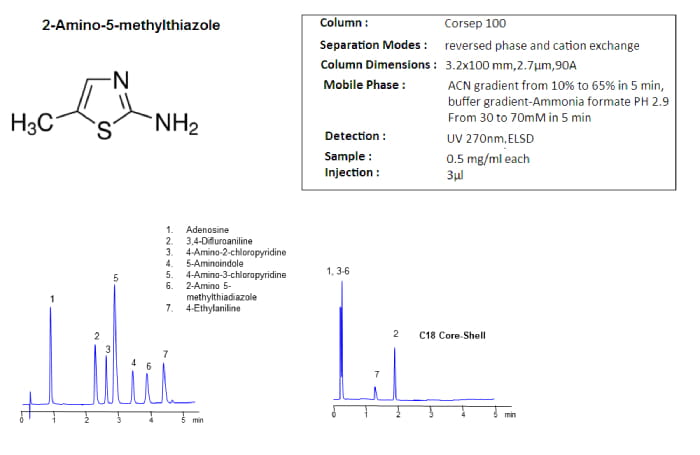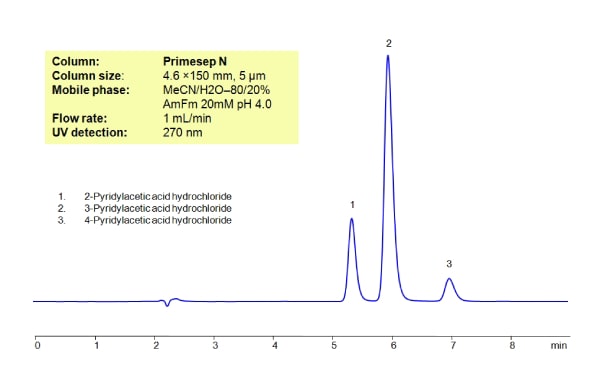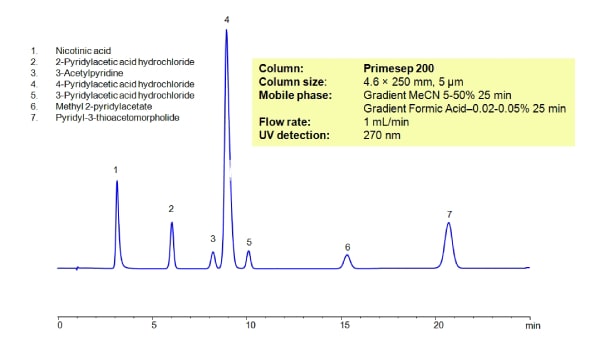Separation of 3,4-Difluroaniline

Get In Touch
Many pharmaceutical and chemical companies need a general approach for analysis of pharmaceutical ingredients and precursors. Developing universal screening procedures in chromatography can help save time in method development and utilize universal platform to analyze complex pharmaceutical mixtures, formulation, metabolites, vitamins, etc. With over 600 reversed-phase column and thousands of mobile phase combinations chemists are facing a challenging task on what column to choose. In a lot of cases scientists need to develop several screening methods to address a complex mixture. Mixed-mode approach which combines reversed-phase, HILIC and ion-exchange mechanisms can address an issue of complex mixtures screening. When multiple columns are screened, very often in different modes of separation, multiple mobile phase needs to be prepared. A simple and universal platform based on mixed-mode columns can be developed. This approach eliminates cumbersome multi-column multi-mobile phase efforts and streamlines method development process. Since mixed-mode columns explore at least two mechanism of interaction selectivity of the separation is drastically different. The model is based on the fact that compounds are retained by combination of reversed-phase and ion-exchange mechanism and that none of the compounds have exactly the same reversed-phase and ion-exchange properties. By exploring small difference in reversed-phase and ion-exchange properties, complex mixtures can be analyzed. The synergy effect of two mechanism allows longer retention and better selectivity than in traditional “single” mode approach. Short method with high efficiency was developed utilizing new core-shell mixed-mode column. All 7 compounds were separated within 5 minutes. Method and Coresep 100 column can be adopted in walk in labs for fast screening of new drug candidates and impurities, components of formulations and building blocks in chemical manufacturing. All methods are compatible with LC/MS and prep chromatography.
Application Name : Separation of Model Compounds in Reversed-Phase and Cation-Exchange Modes on Coresep 100 Mixed-Mode Column
Column Name : Coresep 100 Columns
Analytes : 2-Amino-5-Methylthiadiazole, 3,4-Difluroaniline, 4-Amino-2-Chloropyridine, 4-Amino-3-Chloropyridine, 4-Ethylaniline, 5-Aminoindole, Adenosine

Isomers of Pyridylacetic acid are difficult to resolve using traditional single mode separation chromatography due to their similar structure. However in mixed-mode chromatography it is often an easy task. When more than one mode of interaction is involved (e.g. hydrophobic and cation-exchange on Primesep C or hydrophilic and cation-exchange on Primesep N) then small differences in molecule structure can play significant roles in retention and resolution as a result. In this example 3-Pyridylacetic acid, 2-Pyridylacetic acid and 4-Pyridylacetic acid were separated on mixed-mode Primesep C and Primesep N columns, with a simple mobile phase. Elution of compounds can be monitored by UV, Evaporative Light-Scattering (ELSD), Corona (CAD) or MS detection.
Application Name : HPLC Separation Of Mixture Of Pyridylacetic Acids on Primesep N Column
Column Name : Primesep N Columns
Analytes : 2-Pyridylacetic acid hydrochloride, 4-Pyridylacetic acid hydrochloride, 3-Pyridylacetic acid hydrochloride

Application Name : HPLC Separation Of Mixture of Pyridylacetic Acids And Their Derivatives
Column Name : Primesep 200 Columns
Analytes : Nicotinic Acid, 2-Pyridylacetic acid hydrochloride, 4-Pyridylacetic acid hydrochloride, 3-Pyridylacetic acid hydrochloride, Pyridyl-3-thioacetomorpholide, 3-Acetylpyridine, Methyl-2-pyridylacetate
Get Your Quote or Call: 040-29881474
We focus on supporting laboratory workflows & optimizing lab-wide operations
